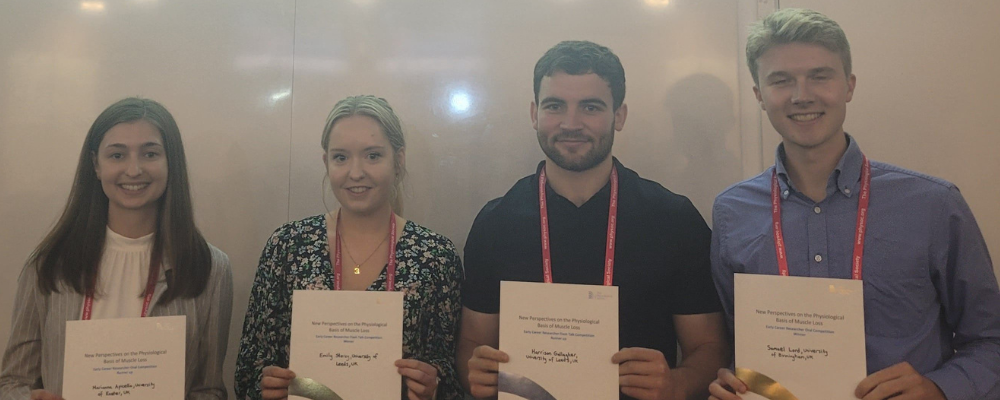
Voice of the Editor
Josephine Adams, Editor-in-Chief and David Wright, Deputy Editor Physiological Reports
“2024 has been an exciting year for Physiological Reports, as the journal has marked the completion of its first 10 years of publication. The growth and success of Physiological Reports over its first decade demonstrates the value of establishing an Open Access physiological journal dedicated to sound science publications.”

2024 has been an exciting year for Physiological Reports, as the journal has marked the completion of its first 10 years of publication. The growth and success of Physiological Reports over its first decade demonstrates the value of establishing an Open Access physiological journal dedicated to sound science publications. It’s estimated that 60% of life sciences researchers have unpublished but prospectively publishable data, including negative results, stored away. This represents a huge deficit of knowledge or laboratory resources for the scientific community as well as having major financial implications (1). Reputable sound science journals offer an obvious route for researchers to bring more of their data to light. It was a pleasure to discuss on Wiley’s network, during Peer Review Week 2024, why publication of sound science matters (2).
Throughout the anniversary year, Physiological Reports has published occasional special editorials and perspectives in an ongoing series (3). The editors have established Methods articles as a distinct category and are featuring an expanded program of Calls for Papers throughout the anniversary year. The latest of these, “Tissue Fibrosis Through the Life Course and in Transplanted Organs”, has just launched. See our page dedicated to all the current Calls for Papers. We welcome submissions of all manuscript types to these Calls, either directly or by transfer from the supporter journals. Authors of papers published under a Call can benefit from the additional visibility generated by the Virtual Collections into which these papers are grouped upon publication, which often results in elevated downloads and / or citations. In parallel, of course, Physiological Reports continues to welcome regular manuscript submissions (either by direct submission or manuscript transfer) in all areas of basic and translational physiology and allied disciplines.
The editors have also expanded the scope of journal awards (which are typically offered as early career researcher poster or presentation awards at major Physiology conferences) by inaugurating a Paper of the Year award to celebrate the research contributions of early career single first authors. The 2023 winner, Aurel Leuchtmann, University of Basel, Switzerland, was interviewed for Spring 2024 issue of Physiology News(4). This award will be continued in future years. We are also running an Early Career Researcher competition for short Review articles on “The Future of Physiology”, as a one-off anniversary year event. The winners of this exciting initiative will be announced later this year – watch this space!
Physiological Reports continues to receive submissions across a broad range of basic and translational physiology topics. Over the first 10 years, exercise physiology and metabolism research have been major areas. Looking ahead, we expect this activity to continue and wish to especially encourage submissions related to new directions in these fields. For example, the current Call for Papers on “Exercise and Diet” is a first step to encourage submissions on topics at the intersection of these two important areas that underpin healthy human physiology. We also wish to encourage submission of studies on the physiological basis of interactions between exercise and pharmacological interventions in preclinical and patient populations, or across different stages of life. Given the increasing popularity of tissue and single cell-based omics platforms, papers leveraging these techniques in descriptive or comparative studies that can generate new hypotheses related to interactions between exercise, nutrition and/or pharmaceutical manipulations would also be welcomed.
Finding expert peer-reviewers remains crucial to upholding the journal’s quality standards of sound research. The recent Peer Review week 2024 focused on exploring “The Intersection of Innovation and Technology”. How AI might be applied to support peer-review processes appears to offer interesting opportunities to streamline quality control or identify prospective reviewers. However, for the foreseeable future, the expertise, skills, time and effort of human experts remain the core of the peer-review process. The editors warmly thank all the researchers who have reviewed manuscripts for Physiological Reports over the last year.
References
- Bowers EC, Stephenson J, Furlong M, Ramos KS. Scope and financial impact of unpublished data and unused samples among U.S. academic and government researchers. iScience. 2023 Jun 19;26(7):107166. doi: 10.1016/j.isci.2023.107166
- https://www.wiley.com/en-us/network/publishing/research-publishing/editors/why-sound-science-matters
- https://physoc.onlinelibrary.wiley.com/doi/toc/10.1002/(ISSN)2051-817X.10th-Anniversary-Collection
- Searching for why and how the body adapts to exercise training: Physiological Report’s Paper of the Year Award 2023. Physiology News Magazine. Spring (April) 2024 – Issue 133. https://doi.org/10.36866/pn.133.28



